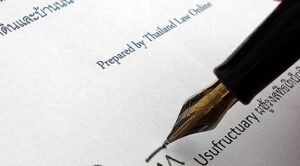 Usufruct in Thailand. For foreigners interested in using or residing in Thai property, navigating ownership restrictions can be frustrating. However, a legal concept called usufruct offers a compelling solution. Let’s delve into usufruct and how it grants temporary ownership rights, allowing you to reap the benefits of Thai property ownership without full title.
Usufruct in Thailand. For foreigners interested in using or residing in Thai property, navigating ownership restrictions can be frustrating. However, a legal concept called usufruct offers a compelling solution. Let’s delve into usufruct and how it grants temporary ownership rights, allowing you to reap the benefits of Thai property ownership without full title.
The Essence of Usufruct
In Thailand, a usufruct, known as “Sidhi-kep-kin,” translates to a temporary ownership right for using and enjoying another’s property. As the usufructuary, you gain the right to reside in, rent out, or leverage the property for your benefit, with the key caveat of preserving its condition. This essentially grants you possession, use, and enjoyment of the property for a specified timeframe.
Key Considerations for Usufruct
- Usufruct applies only to immovable property, typically land and buildings.
- A usufruct is established through a registered agreement with the owner. This agreement outlines the terms, including the duration of the usufruct.
- The usufructuary is responsible for maintaining the property and returning it to the owner in the same condition it was received.
- Usufructuary rights cannot be transferred to another person.
- Usufructuary agreements can be set for a fixed term, such as a specific number of years, or for the lifetime of the usufructuary.
Benefits of Owning Without Owning
Usufruct offers several advantages, particularly for foreigners who are prohibited from owning land outright in Thailand. It grants access to property benefits, providing a pathway to enjoy a Thai residence or generate rental income. The flexibility of usufruct agreements allows for customization based on your needs, with durations ranging from a few years to a lifetime.
Understanding the Caveats
While usufruct offers significant advantages, it’s crucial to understand its limitations. You don’t become the legal owner of the property. This means you cannot sell it or use it as collateral for a loan. Additionally, the responsibility of upkeep falls on you, including managing any taxes and associated fees. Lastly, the usufruct terminates upon expiry of the term or the usufructuary’s death.
Seeking Expert Guidance
Usufruct agreements can involve complexities. Consulting a lawyer with expertise in Thai property law is vital to ensure the agreement protects your interests and complies with Thai regulations. They can guide you through the process, draft the agreement meticulously, and ensure its proper registration.
By gaining a comprehensive understanding of usufruct, you can unlock opportunities to enjoy Thai property and its associated benefits. Remember, seeking professional advice is key to navigating the legalities and ensuring a smooth experience.
